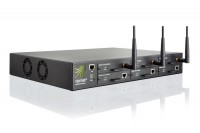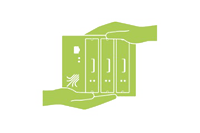Unbelievable, what bonding DSL, UMTS and LTE makes possible
Reliable e-cash in 120+ stores
Buying groceries has never been easier than today: If the supermarket of your choice doesn’t have an online shop yet, at least it doesn’t require you to carry cash around; just choose the articles you need and purchase them with your credit card – the Internet makes it all possible. However, as supermarkets become more and more dependent on the Internet, their requirements regarding a powerful connection increase as well: POS systems are centralized, alarms are connected with security services, telephony is realized via VoIP; some stores even offer e-learning for their employees which can be accessed 24/7. All these applications need a reliable and high-bandwidth connection. This is why one of the largest food retailers of the Netherlands, Detailresult Group, chose to install a Viprinet solution in their stores.
Internet for every contingency
One second of inattentiveness is enough to risk a major fire. The fire brigade rush to the place of the incident, and soon, questions arise: Are enough fire fighters present? Are we equipped with the right tools? Which chemicals need to be neutralized? These are questions for experts which are best kept in the command center to be available for more than one emergency team. However, only talking about the scene and describing the difficulties is fairly unfeasible, so emergency services need a stable and reliable mobile Internet connection that is suitable for video streaming regardless of location as well as of eventual bystanders calling or texting friends and family. Incendium, a Danish live streaming company, meets these demands by using Viprinet technology.
E-Learning sped up
Slow Internet speeds and frequent outages were the major hurdles stopping Emmanuel Anglican College (EAC) from transitioning to a digital learning platform. Situated in Ballina in northern NSW, EAC’s regional location meant the school was literally positioned at the very end of serviceable ADSL, meaning connectivity was extremely cumbersome and unreliable. To achieve the school’s goals of enabling online learning for their students, EAC turned to Viprinet and their Australasian partner Wired Sky for the solution.






















